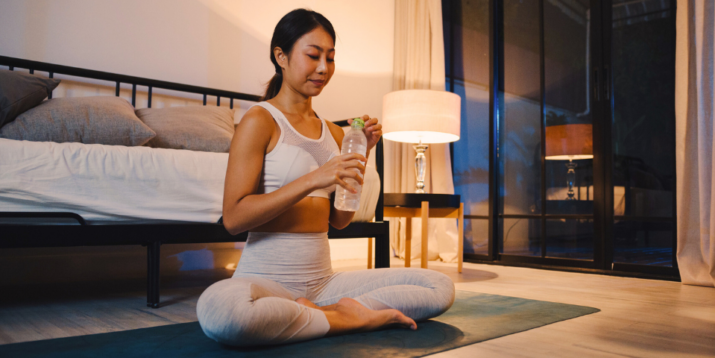Can’t Sleep After an Evening Workout? Follow These Tips to Power Down

You planned to exercise earlier in the day, but life got in the way. Now you finally have time to squeeze in a workout, but it’s getting close to bedtime — and you’re worried that late-night activity will mess with your ability to fall asleep.
You don’t want to be on a post-exercise endorphin kick at midnight, but you don’t want to skip a workout either — so what should you do? Here are some tips for when you can’t sleep after a workout.
How Exercise Affects Your Sleep Habits
For the most part, exercise and sleep have a positive impact on one another — research suggests people who sleep better tend to exercise, and vice versa.
That said, exercise — especially high-intensity exercise — affects the body in a way that can make it tricky for some of us to get to sleep quickly afterward.
When you work out, your metabolism and heart rate temporarily increase, which also bring an increase in nervous system activity, says Jeffrey Potteiger, Ph.D., associate vice provost of graduate school and professor in the department of movement science at Grand Valley State University in Grand Rapids, Michigan. These increases can keep your body in a heightened state, which delays your body’s process of preparing for sleep.
3 Remedies if You Can’t Sleep After a Workout
“It takes two to three hours to power down after a workout,” Potteiger says. But tere are a few simple sleep routine tips you can use to get your body sleep-ready after a late-night exercise session.
1. Cool down (literally)

As your body prepares for sleep, your core temperature drops. This signals to your brain that it’s nearly bedtime, says W. Chris Winter, M.D., sleep specialist and author of The Sleep Solution: Why Your Sleep is Broken and How to Fix It. Your body’s sleep-inducing chemicals won’t kick in until your body temperature drops — so if you’re still sweating from your late-night HIIT workout, that could delay your bedtime.
To keep heat from messing with your sleep, focus on cooling down as quickly as possible after your workout. Winter suggests taking a lukewarm shower and drinking a glass of cold water. And make sure your bedroom environment is cool enough to encourage sleep. According to Winter, most of us fare well when temps are right around 68° F.
If you can’t get your bedroom to an optimal temperature, look to the latest sleep tech — like sweat-wicking sheets and temperature-regulating pillows — to help cool you down.
2. Minimize light

Light plays a major role in sleep regulation, and blue light, in particular, has a powerful effect on your circadian rhythm. In the morning, blue light from the sun helps wake you up. At night, however, blue light sends the wrong message: “It convinces your brain that the sun is rising again, which tends to block melatonin,” Winter says. (Melatonin is the hormone that regulates your sleep-wake cycles and helps you feel sleepy at bedtime.)
Unfortunately, blue light is the bane of most people’s sleep hygiene: It’s everywhere — your phone, your laptop, your tablet, your TV, and fluorescent and LED lighting. Ideally, you should shut off screens about three hours before bedtime.
If that’s not possible — maybe you stream your workouts online, or you just can’t resist scrolling through social media before bed — Winter recommends wearing blue-blocking glasses for three hours before bed.
Research suggests this timing can help your sleep habits. One study found that adults who wore blue-blocking glasses for three hours before bed saw greater improvements in sleep quality by the end of three weeks than those who didn’t. And a study of teenage boys who used blue-blocking glasses during evening screen time revealed similar findings.
3. Meditate

Research suggests that meditation can affect sleep habits. One study found that sleep-disturbed adults who followed a six-week mindfulness meditation program saw greater improvements in sleep quality, mood, and daytime energy than those who followed a six-week sleep education program.
If you’re new to the practice, try a guided meditation. BODi’s Sound Meditation program features four categories of meditation, to help you relax, unwind, and get better quality sleep. Otherwise, simply take five minutes post-workout to sit in a quiet area and focus on relaxing your muscles. Start from your toes and progress to your head, Winter says.
Or, choose an activity that you find relaxing and meditative — “Something you can get in the habit of doing as soon as the exercise is over to paint a picture for your nervous system that it’s time to start turning off,” Winter says.
Just make sure you choose an activity that will calm you down, not rev you up — in other words, this may not be the best time to “relax” by catching up on The Walking Dead.
